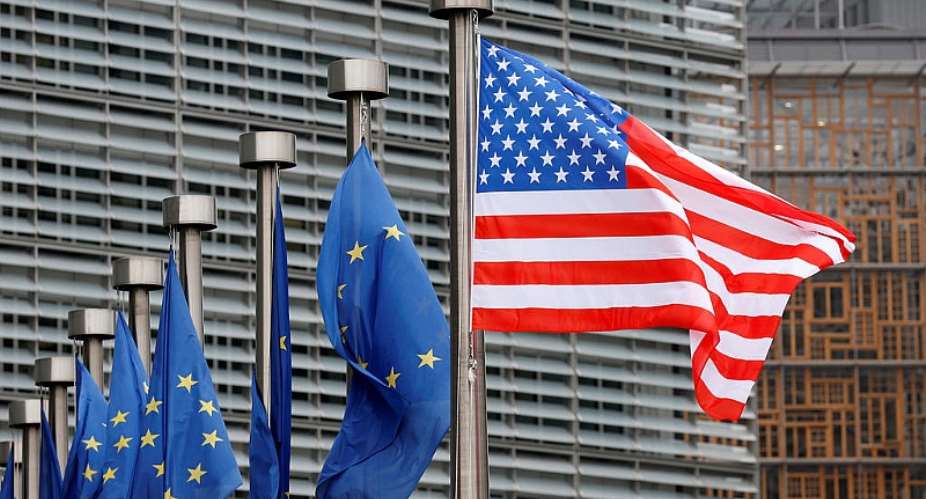The frayed relationship between Europe and the United States is on an expected path to repair as President Joe Biden paves the way for renewed cooperation on climate change, security, defence and more – however the issue of trade may prove tricky.
With the transatlantic partnership dropping to unprecedented lows during four years of Donald Trump, moves are afoot in both Brussels and Washington to reshape and renew areas of common policy.
This means plenty of teamwork – or multilateralism – and adhering to international rules and institutions.
“Europe is definitely not waiting for the United States to make the first move,” says Celia Belin, a foreign policy expert at the Brookings Institute, a think tank based in Washington DC.
It's for this reason that Brussels laid out its agenda for transatlantic cooperation – even before Trump left office.
“Europeans know that if they want to push international agreements or international initiatives, it has to come to come from them,” Belin adds.
Indeed, Europe is looking forward to turning the page on the unabated US nationalism and hostile foreign policy that saw Trump abandon the Paris climate agreement, the Iran nuclear deal and the World Health Organization (WHO), as well as slap tariffs on German steel imports and French wine.
Restoring international order
Described as the most “pro-Atlanticist” president since George HW Bush, Joe Biden is hastily winding back the clock on Trump's America-first approach by returning to the table with allies and rejoining international treaties and organisations, including the Paris accord and the WHO.
So far, though, he's made no promises on ending tariffs on EU products.
Trade will prove a thornier subject, warns Belin, with Biden's administration remaining careful to protect America's middle class.
“It would be a mistake for Biden to simply undo the Trump administration like Trump did with the Obama administration,” she explains. “Biden recognises the Trump administration had a point in tackling unfair trade practices.”
Existing tariffs on EU goods also offer Biden some leverage in future trade talks.
Familiar faces
One resounding question is whether Trump's shake-up of US foreign policy will have a lasting impact, or whether the past four years are more of an anomaly that can be corrected. The answer may be both.
Many of Biden's top advisers are familiar faces – experts in transatlantic affairs who served in the Obama administration. These include his picks for senior jobs in the State Department and National Security Council, whose remit is being expanded to focus more on global health, human rights and democracy.
Analysts say that, going forward, policymakers on both sides of the Atlantic consider a solid EU-US partnership to be crucial in re-establishing order on the world stage and drowning out the voices of the populist leaders driving isolationist national agendas.
- Biden administration draws mixed reactions from Washington's enemies
- 'We wanted to be a part of this change' say Biden supporters outside US Capitol
Included in that strategy is Biden's push to create a D10 global summit of democracies committed to combating authoritarian states.
Beyond that, bridging the transatlantic rift means revamping the NATO defence alliance and revisiting outdated rules governing the World Trade Organisation. It will also involve forming a common strategy toward China and Russia, and closer collaboration on dealing with the global Covid-19 pandemic.
“The Europeans are less naive than before, and they're also more ready to defend their own interests,” says Belin, adding that much has changed in the four years of Donald Trump.
“The EU now perceives itself as a strategic actor, a geopolitical actor and a very strong geo-economic actor in which the US can find a partner.”





 Tuesday’s downpour destroys ceiling of Circuit Court '8' in Accra
Tuesday’s downpour destroys ceiling of Circuit Court '8' in Accra
 SOEs shouldn't compromise on ethical standards, accountability – Akufo-Addo
SOEs shouldn't compromise on ethical standards, accountability – Akufo-Addo
 Father of 2-year-old boy attacked by dog appeals for financial support
Father of 2-year-old boy attacked by dog appeals for financial support
 Jubilee House National Security Operative allegedly swindles businessman over sa...
Jubilee House National Security Operative allegedly swindles businessman over sa...
 Nobody can order dumsor timetable except Energy Minister – Osafo-Maafo
Nobody can order dumsor timetable except Energy Minister – Osafo-Maafo
 Mahama wishes National Chief Imam as he clock 105 years today
Mahama wishes National Chief Imam as he clock 105 years today
 J.B.Danquah Adu’s murder trial: Case adjourned to April 29
J.B.Danquah Adu’s murder trial: Case adjourned to April 29
 High Court issues arrest warrant for former MASLOC Boss
High Court issues arrest warrant for former MASLOC Boss
 Align academic curriculum with industry needs — Stanbic Bank Ghana CEO advocates
Align academic curriculum with industry needs — Stanbic Bank Ghana CEO advocates
 Election 2024: We'll declare the results and let Ghanaians know we've won - Manh...
Election 2024: We'll declare the results and let Ghanaians know we've won - Manh...
